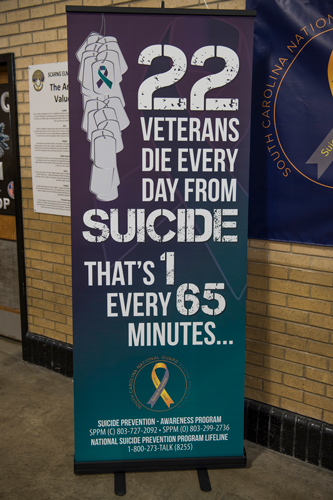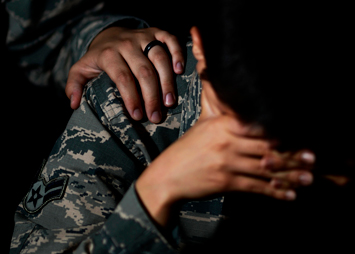By Charlene Muhammad CHARLENEM

The U.S. Army is no longer automatically disqualifying recruits that suffered from some mental health disorders and who may have had drug and alcohol problems.
The Army has lifted a 2009 ban on recruits with predetermined mental health disorders, such as self-mutilation, and mood disorders like depression and bipolar disorder.
Some anti-war activists believe the change is to deny more post-war veterans benefits by saying mental health problems or issues existed before military service. Others say the changes stem from the anti-war movement’s impact on recruitment.
The policy change applies to regular Army and Army Reserve applicants, according to an Army internal memo published in USA Today.
Lt. Col. Randy Taylor, an Army spokesman, told USA Today the decision was primarily due to increased availability of medical records and other data. The Army can better document applicant medical histories with this increase in information, he said.

USA Today said the Army enacted a ban on certain applicants in 2009 due to an epidemic of suicide in the military service. There were 160 active duty suicide deaths in 2009, with 239 including Army active and reserve units, according to a report by Peter Chiarelli, then Army Vice Chief of Staff General. As of March 31, 2016, Army active duty deaths numbered 273 for 2016, and totaled 466 including the Reserves and National Guard, according to the Department of Defense. Historically, the Army suicide rate had been significantly lower than the civilian rate, typically about 19.2 per 100,000. Army suicide and accidental death rates began trending upward in 2004, and in 2008, the Army suicide rate crested above the national average, reaching a record 20.2 per 100,000, said Mr. Chiarelli in a 2010 report on suicide prevention.
Previously the Army would not grant waivers to applicants suffering from these conditions, said USA Today.
Army applicants must provide supporting documentation, including psychiatric evaluations and “clearance” to be considered for induction into the service.
“I think what this may have more to do with is the issue of providing benefits for people,” said Michael Prysner, political activist and veteran of the Iraq and Afghanistan wars.
“I have a lot of experience working with service members, who have post-traumatic stress disorder, depression, other types of psychological problems and injuries related to service in Iraq and Afghanistan and trauma in Iraq and Afghanistan. And in all of these cases, if you have post-traumatic stress disorder from a deployment, then you’re entitled to benefits for the rest of your life,” Mr. Prysner told The Final Call.
That includes disability payments, free medical treatment, and other entitlements.

According to Mr. Prysner, in every single case where he’s tried to help soldiers get access to benefits–compensation, treatment, and not being redeployed–the Army denied the appeals, claiming the soldiers had a pre-existing condition.
“They’ll go in your medical paperwork and try to find some evidence of some kind of psychological problem or depression in the past, and use that as a basis by which to deny them medical care and compensation and things like being exempt from deployment, if they claim to have trauma from a recent deployment,” Mr. Prysner stated.
The Final Call’s emails and phone requests for comment from an Army spokesperson were unreturned at press time.
Troy Paisley, Army Waivers Branch Chief, said in an August 2017 internal memo that the changes only mean these additional applicants can be considered for military service.
People entering the military who are considered “totally fit” are physically and mentally changed during and upon exit, said Wendy McClinton, president and CEO of Black Veterans for Social Justice, Inc., based in New York.
“I fear to imagine what will happen to those who enter on a waiver and must have the ability to endure the rigorous trainings and tactics that come with transitioning from a civilian to a soldier,” said the United States Army veteran.
“In my opinion, with the new administration in Washington, the climate is not only open to war but the collateral damages that come with it,” Ms. McClinton said.
The Army has a mandate to get to 1,018,000 soldiers–476,000 of those active duty–by the end of September, according to Meghann Meyers of Army Times. She wrote the active force must jump from a planned 460,000 soldiers to 476,000; the National Guard from 335,000 to 343,000; and the Army Reserve from 195,000 to 199,000.
As of June 2, the active Army had reached 55 percent of its recruiting and 73 percent of its retention goals, Ms. Meyers wrote in her story published that same month.
The Final Call asked the Army if September recruiting goals were met, but did not receive an answer.
The Army offered $10,000, and then later $5,000 bonuses for any soldier with the option to leave in 2017, who stayed for another year. Also, new recruits may do two years in the Army and get out with 80 percent of their education and training benefits, continued Ms. Meyers.
The Pew Research Center said the U.S. military presence overseas is at a 60-year low.
According to data analysis by Kristen Bialik, a Pew research assistant, “There were around 1.3 million total active-duty U.S. military personnel in 2016. Of these, 193,442–or 15 percent–were deployed overseas. That’s the smallest number and share of active-duty members overseas since at least 1957, the earliest year with comparable data.”
“The fact is that there really is not a recruiting shortage right now. This isn’t like it was during the height of the Iraq War where so few people were joining the military, that they couldn’t meet their recruiting numbers,” said Mr. Prysner.
The military did things like keep people past their contracts, lowered recruiting standards, and other schemes to make up for the fact that large numbers of people weren’t joining anymore, he said.
That was then.
“In fact, the military has actually gone through a downsizing phase, where they’re actually trying to get people out of the military,” Mr. Prysner told The Final Call. There are all types of issues around people who want to stay in getting pushed out without benefits, he added.

“With this decision, it’s letting in all of these people who were prone to psychological problems, prone to suicide, prone to depression, prone to all the types of things that are exacerbated by serving in the military and going to war,” he continued.
“Now when they get sent to Afghanistan and they come home suicidal because of their deployment to Afghanistan, the Army will say to them, well you had a pre-existing condition, so we’re not going to help you. We’re not going to give you any benefits. We’re not going to give you any treatment. And, we’re going to send you back to Afghanistan again. I think that’s really the untold story about this whole decision.”
But with the Trump administration sabre rattling, there is fear the United States could be on the brink of another war. There have also been many instances in which military vets have engaged in mass shootings and killings. Often family members say their loved one was not the same after military deployment or military service.
“Right in line with his teacher, the Most Honorable Elijah Muhammad, the Honorable Minister Louis Farrakhan has continued to echo the fact that we should not partake in wars that take the lives of human beings, unless America gives us the necessary territory in which we will have something to fight for,” said Jesse Muhammad, who manages social media for the Minister and leads the Farrakhan Twitter Army.
Minister Farrakhan again made it clear during an historic Nov. 16 press conference, in which he delivered a final message to President Donald Trump from the Watergate Hotel, that Blacks’ days of fighting for America’s madness is over, said Mr. Muhammad.
That clip of Min. Farrakhan has been circulating on various social media sites, and has generated favorable responses, even from U.S. military veterans, he said.
How people feel about military service depends on who’s asked, according to Ms. McClinton. Some, like her, saw honor and had generations of family members in the military. “Once in the military and having experienced the negative side of it turned my stomach against the negative, abusive and harassing practices but not its purpose,” she said.
“Every one of you that have done a tour of duty in Iraq or Afghanistan: You really need to sue the government with a ‘class action suit,’ because the president was a liar, the vice president was a liar, and secretary of state was a liar. They all lied, because they put up a policy that wasn’t backed by intelligence; they skewed intelligence to back a policy, and they attacked Iraq on the basis of a lie. … Don’t send your son over there, because he may not be coming back; because they’re not going to spare you because you’re Black, as the Japanese did once, telling you ‘Same same! Same same!’ … But don’t go today–you’re going to have to tell them, ‘Same same.’ But the response will be: ‘Well if you’re ‘same same,’ what are you doing here?’ So, they’ll kill you, too,” Min. Farrakhan warned during one in a series of meetings in St. Louis leading up to the 20th Anniversary of the Million Man March in 2015.
“Particularly to Black youth that are hearkening to the voice of Min Farrakhan, think about this. Who in their right mind, after hearing the Minister on Nov. 16, lay out the genocidal plot to kill Black people and, Black youth in particular, after hearing him unpack all of that, who in their right mind would want to fight for a wicked enemy like that? Who would want to have the tendency or urge to pledge their allegiance to a nation that has pledged their allegiance to killing us?” asked Jesse Muhammad.












